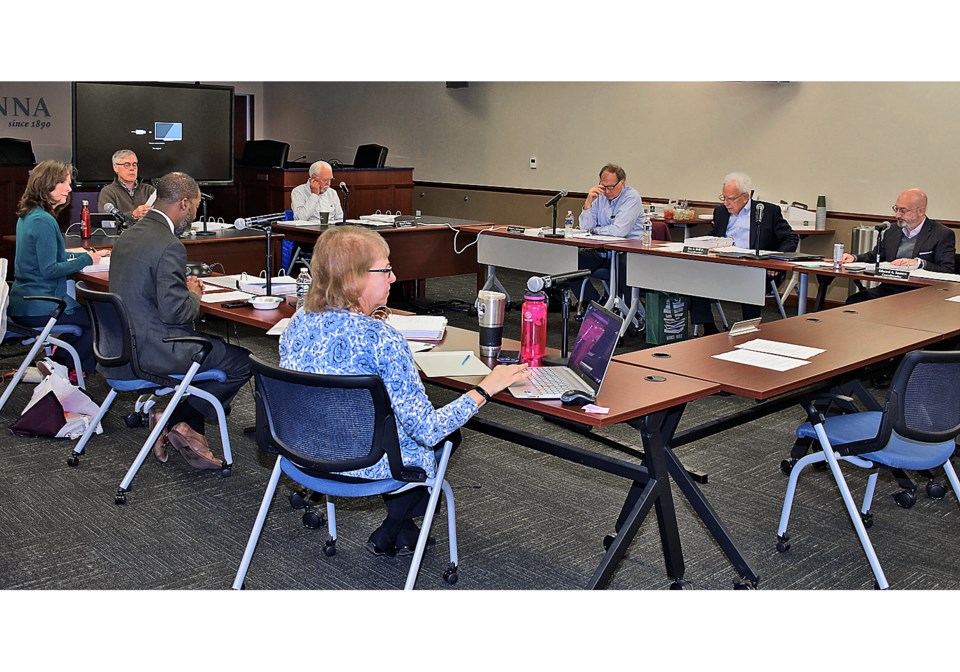Vienna Town Manager Mercury Payton’s proposed $50.1 million fiscal 2024 budget calls for a slightly lower real-estate-tax rate and a healthy boost for employee wages.
Payton’s budget would reduce the real-estate-tax rate by a quarter-cent to 20.25 cents per $100 assessed value. But because residential assessments grew by a whopping 10.6 percent this year, homeowners still would have to fork over $162 more even if the Town Council approved the rate cut.
“We are pleased that we’re able to do some sort of rate reduction,” Payton said. “We want to be mindful that whatever amount we go to, we can sustain it in subsequent years without having to raise it back up again.”
Town officials do not have control over real-estate assessments and were surprised to see them go up so much again this year, said Finance Director Marion Serfass. But residential builders around town recently have been reporting slowdowns in activity, she added.
Non-residential assessments rose 4.7 percent this year. One cent on Vienna’s tax rate generates an estimate $673,200 in revenue.
Vienna is part of Fairfax County and town property owners pay country real-estate taxes as well. If the Board of Supervisors does not lower the county’s tax rate from $1.11 per $100 assessed value – and indications are they will cut it somewhat – the average homeowner would pay $520 more.
Vienna’s proposed budget, consisting of four funds, is up $1.4 million (2.9 percent) and the general-fund budget would increase by 4.7 percent.
Most town employees would receive 5-percent raises (a cost-of-living adjustment plus merit increase); sworn police officers would get 5.5-percent pay hikes.
The pay raises would boost the budget by $472,800 and necessitate an additional $270,000 in salary-linked benefit payments. Town officials had projected a 5-percent rise in health-insurance expenses, costing $138,000, but it did not materialize, Serfass said.
Recruiting qualified employees also is tough in the highly competitive, high-wage Washington region. The town only is prepared to go so far in terms of salaries, she said.
“We have no desire to be the wage leader, but we want to give a fair, living wage,” Serfass said.
The town will save about $114,000 in overtime costs during fiscal 2024 because it has filled some vacant positions, which previously caused staffers to work overtime to fulfill those duties, she said.
“We’re looking for any place we can cut in these years of inflation and reasonably still provide services to our residents,” Serfass said.
Town officials kicked off the budget process earlier this fiscal year and presented department heads’ goals to the Town Council last December. The Council in January ranked its own set of priorities.
The accelerated process “helped us to better shape this budget” and aligned departmental initiatives with the Council’s thinking, Payton said.
The budget contains no new programs except initiatives related to the Council’s expressed priorities of completing the “Code Create” zoning-code rewrite; finishing the town’s parks master plan, including the disposition of the “annex” property at 301 Center St., S.; protecting and increasing the town’s tree canopy; and reviewing and revising Vienna’s noise ordinance.
Payton required town department heads to calculate their fiscal 2024 budgets as close as possible to the amounts proposed for the previous year’s budget, minus salary and benefit increases.
Payton’s budget calls for two additional full-time employees: a senior compliance officer with the Department of Planning and Zoning and a civil-and-capital-projects engineer with the Department of Public Works.
Town officials carefully are monitoring inflationary impacts on items such as fuel costs and the planned conversion to more electric vehicles, Serfass said.
Town officials expect meals-tax revenues, which finance Vienna’s capital-improvement projects, to grow by 5.5 percent in fiscal 2024. The trend indicates town restaurants have more than recovered from the pandemic, officials said.
The town’s debt-service fund would decrease by nearly $954,000 (14.8 percent) because the town has not issued any new debt and is paying less as existing bonds mature.
Vienna’s water-and-sewer fund would increase about $745,000 (6.5 percent) because of increases in wholesale-water purchases, general-fund transfers, salary increases and sewer-treatment costs.
If the Council approved proposed rate increases, the average homeowner, who uses about 12,000 gallons of water per quarter, would pay $81 (9.3 percent) more over the course of the next fiscal year.
The town’s stormwater fund would receive 41.5 percent more, in part to cover the cost of a $125,000 Special Flood Hazard Area study.
Vienna’s commercial properties continue to fare well, having only a 6.1-percent vacancy rate at the end of last year, versus 16.3 percent for Fairfax County.
The Town Council will hold budget work sessions at Vienna Town Hall on March 11 from 9 a.m. to 5 p.m. and March 13 starting at 7:30 p.m. The Council will hold a public hearing on April 10 at 8 p.m. regarding the proposed budget, as well as water and sewer rates, and another hearing April 24 at 8 p.m. All those hearings will be at Town Hall.
The Council will adopt the fiscal 2024 budget, tax rate, and water and sewer rates on May 15. The new fiscal year will begin July 1.



